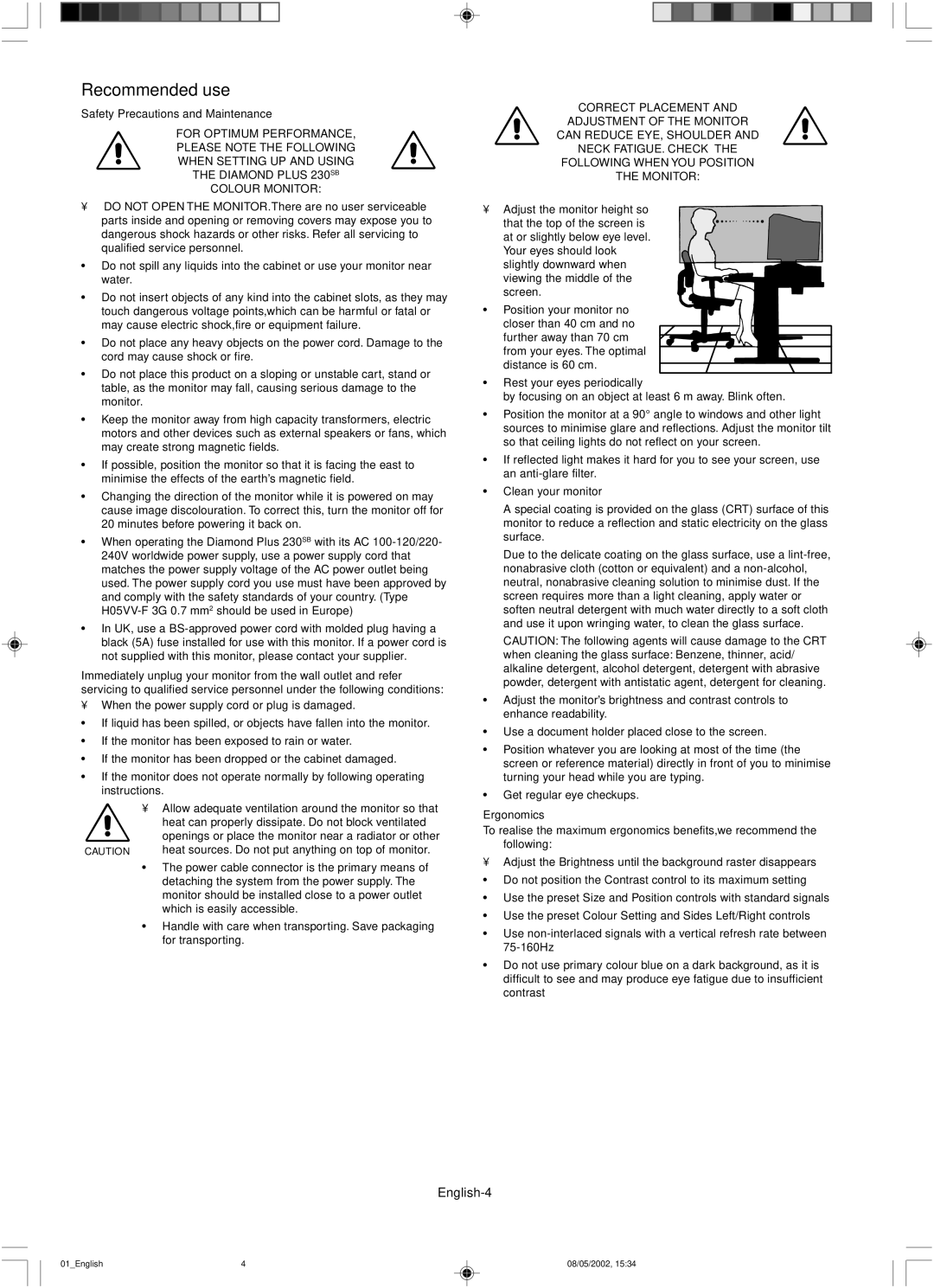
Recommended use
Safety Precautions and Maintenance
FOR OPTIMUM PERFORMANCE,
PLEASE NOTE THE FOLLOWING
WHEN SETTING UP AND USING
THE DIAMOND PLUS 230SB
COLOUR MONITOR:
•DO NOT OPEN THE MONITOR. There are no user serviceable parts inside and opening or removing covers may expose you to dangerous shock hazards or other risks. Refer all servicing to qualified service personnel.
•Do not spill any liquids into the cabinet or use your monitor near water.
•Do not insert objects of any kind into the cabinet slots, as they may touch dangerous voltage points,which can be harmful or fatal or may cause electric shock,fire or equipment failure.
•Do not place any heavy objects on the power cord. Damage to the cord may cause shock or fire.
•Do not place this product on a sloping or unstable cart, stand or table, as the monitor may fall, causing serious damage to the monitor.
•Keep the monitor away from high capacity transformers, electric motors and other devices such as external speakers or fans, which may create strong magnetic fields.
•If possible, position the monitor so that it is facing the east to minimise the effects of the earth’s magnetic field.
•Changing the direction of the monitor while it is powered on may cause image discolouration. To correct this, turn the monitor off for 20 minutes before powering it back on.
•When operating the Diamond Plus 230SB with its AC
•In UK, use a
Immediately unplug your monitor from the wall outlet and refer servicing to qualified service personnel under the following conditions:
•When the power supply cord or plug is damaged.
•If liquid has been spilled, or objects have fallen into the monitor.
•If the monitor has been exposed to rain or water.
•If the monitor has been dropped or the cabinet damaged.
•If the monitor does not operate normally by following operating instructions.
•Allow adequate ventilation around the monitor so that
| heat can properly dissipate. Do not block ventilated |
| openings or place the monitor near a radiator or other |
CAUTION | heat sources. Do not put anything on top of monitor. |
•The power cable connector is the primary means of detaching the system from the power supply. The monitor should be installed close to a power outlet which is easily accessible.
•Handle with care when transporting. Save packaging for transporting.
CORRECT PLACEMENT AND
ADJUSTMENT OF THE MONITOR
CAN REDUCE EYE, SHOULDER AND
NECK FATIGUE. CHECK THE
FOLLOWING WHEN YOU POSITION
THE MONITOR:
•Adjust the monitor height so
that the top of the screen is at or slightly below eye level. Your eyes should look slightly downward when viewing the middle of the screen.
•Position your monitor no closer than 40 cm and no
further away than 70 cm from your eyes. The optimal distance is 60 cm.
•Rest your eyes periodically
by focusing on an object at least 6 m away. Blink often.
•Position the monitor at a 90° angle to windows and other light sources to minimise glare and reflections. Adjust the monitor tilt so that ceiling lights do not reflect on your screen.
•If reflected light makes it hard for you to see your screen, use an
•Clean your monitor
A special coating is provided on the glass (CRT) surface of this monitor to reduce a reflection and static electricity on the glass surface.
Due to the delicate coating on the glass surface, use a
CAUTION: The following agents will cause damage to the CRT
when cleaning the glass surface: Benzene, thinner, acid/ alkaline detergent, alcohol detergent, detergent with abrasive powder, detergent with antistatic agent, detergent for cleaning.
•Adjust the monitor’s brightness and contrast controls to enhance readability.
•Use a document holder placed close to the screen.
•Position whatever you are looking at most of the time (the screen or reference material) directly in front of you to minimise turning your head while you are typing.
•Get regular eye checkups.
Ergonomics
To realise the maximum ergonomics benefits,we recommend the following:
•Adjust the Brightness until the background raster disappears
•Do not position the Contrast control to its maximum setting
•Use the preset Size and Position controls with standard signals
•Use the preset Colour Setting and Sides Left/Right controls
•Use
•Do not use primary colour blue on a dark background, as it is difficult to see and may produce eye fatigue due to insufficient contrast
01_English | 4 | 08/05/2002, 15:34 |
